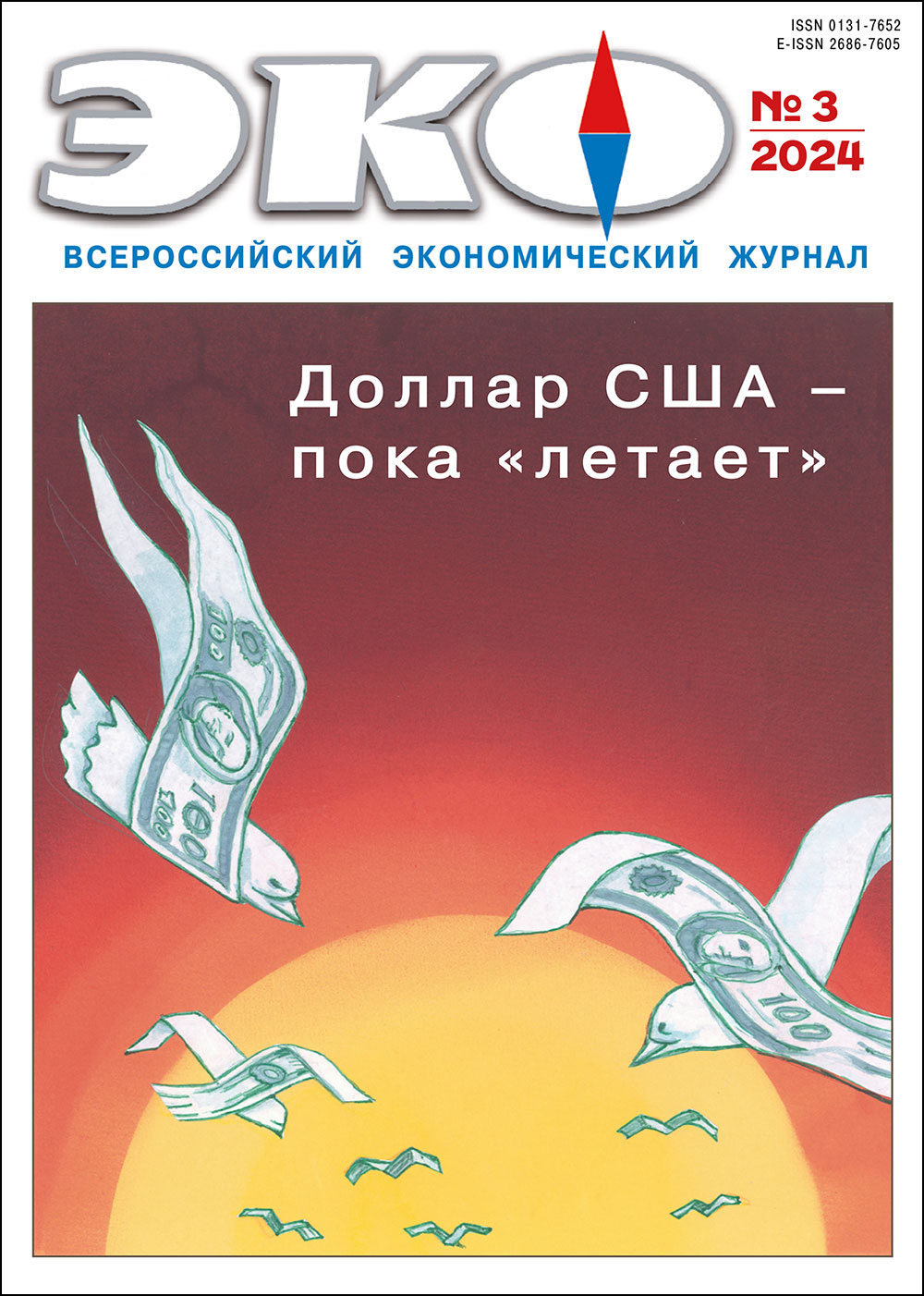Cover story: The US dollar – so Far «Flying»
Published 2024-06-03
Keywords
- international liquidity,
- reserve assets,
- international payments,
- center and periphery,
- per capita income
- purchasing power,
- transferable ruble,
- dedollarization,
- BRICS ...More
How to Cite
1.
Kuznetsov А. Dedollarization of International Settlements: Trends and Рrospects. ECO [Internet]. 2024 Jun. 3 [cited 2026 Feb. 19];54(3):8-32. Available from: https://ecotrends.ru/index.php/eco/article/view/4733
Abstract
The paper discusses the reasons for the dysfunctional nature of the current international monetary standard. The use of the US dollar as a global price benchmark leads to a permanent underestimation of the purchasing power of currencies of countries with developing and emerging market economies, deepens socio-economic polarization between the global core and periphery. It is shown that the contradiction between the unipolarity of world finance and multipolarity of the world economy is the cause of income imbalances. The main costs are borne not only by developing countries that are unable to create international (reserve) liquidity in their own national currencies, but also by developed countries – issuers of other reserve assets. The main initiatives to create alternative international settlement and payment mechanisms have been systematized. An innovative approach to the design of settlement infrastructure within the BRICS+ group of countries in order to organize international cooperation on an equal footing is proposed.References
- Арапова Е.Я. Азиатская валютная единица: в поисках оптимальной структуры валютной корзины // Мировая экономика и международные отношения. 2015. № 1. С. 40–51.
- Батиста П.Н. Финансовые и монетарные инициативы БРИКС // Международный дискуссионный клуб «Валдай». 2023. 3 окт. URL: https://ru.valdaiclub.com/a/highlights/finansovye-i-monetarnye-initsiativy-briks/ (дата обращения: 18.01.2024).
- Борисов С.М. Рубль – валюта России. М.: Издательство «Консалтбанкир», 2004. 422 с.
- Бьерг У. Как делаются деньги? Философия посткредитного капитализма. М.: Ад Маргинем Пресс, 2023. 312 с.
- Винокуров Е.Ю., Гричик М.В. Новая концепция международных резервов: безопасность, диверсификация, неортодоксальные подходы // Вопросы экономики. 2022. № 12. С. 24–43. https://doi.org/10.32609/0042–8736–2022–12–24–43
- Винокуров Е.Ю., Левенков А.С. Глобальная сеть финансовой безопасности: эволюция антикризисной функции в мировой финансовой архитектуре // Вопросы экономики. 2021. № 5. С. 26–42. https://doi.org/10.32609/0042–8736–2021–5–26–42
- Глазьев С.Ю. За горизонтом конца истории. М.: Проспект, 2021. 416 с.
- Звонова Е.А., Кузнецов А.В. Фундаментальные дисбалансы в мировой финансовой архитектуре // Российский экономический журнал. 2016. № 4. С. 19–31.
- Константинов Ю.А. Международная валютная система стран – членов СЭВ. М.: Финансы и статистика, 1982. 232 с.
- Кузнецов А.В. Восточный вектор трансформации мировой валютной системы // Мировая экономика и международные отношения. 2023a. Т. 67. № 7. С. 22–32. DOI: 10.20542/0131–2227–2023–67–7–22–32.
- Кузнецов А.В. Концептуальные подходы к формированию устойчивой мировой валютно-финансовой системы // Финансы: теория и практика. 2023b. Т. 27. № 4. С. 164–172. https://doi.org/10.26794/2587–5671–2023–27–4–164–172
- Навой А.В. Трансформация подходов к построению системы антикризисного функционирования основных международных финансовых институтов в условиях новых геополитических вызовов // Контуры глобальных трансформаций: политика, экономика, право. 2022. Т. 15. № 6. С. 28–45. DOI: 10.31249/kgt/2022.06.02
- Перестройка мировой валютной системы и позиция России / Отв. ред. И.Н. Платонова. М.: Книжный дом «ЛИБРОКОМ», 2009. 240 с.
- Ashworth, М. (2023). The Dollar Will Vanquish Pretenders to Its Throne. The Washington Post. 29.01.2023. Available at: https://www.washingtonpost.com/business/energy/the-dollar-will-vanquish-pretenders-to-its-throne/2023/01/26/3a58355e-9d39–11ed-93e0–38551e88239c_story.html (accessed 18.01.2024).
- Barrowclough, D., Kozul-Wright, R., Kring, W.N., Gallagher, K.P. (eds.). (2022). South–South Regional Financial Arrangements. Collaboration Towards Resilience. Palgrave MacMillan. 375 p.
- De Grauwe, P. (2016). The Legacy of the Eurozone Crisis and How to Overcome It. Journal of Empirical Finance. Vol. 39. Part B, December. Pp. 147–155. https://doi.org/10.1016/j.jempfin.2016.01.015
- Eichengreen, B. (2010). Global Imbalances and the Lessons of Bretton Woods. MIT Press. 205 p.
- Eichengreen, B. (2012). Exorbitant Privilege: the Rise and Fall of the Dollar. Oxford University Press. 224 p.
- Hankel, W., Isaak, R. (2011). The Brave New World Economy: Global Finance Threatens Our Future. Hoboken, New Jersey, John Wiley & Sons. 288 p.
- Lissovolik, Y. (2023). How Does the BRICS Currency Transform the World Economy? Modern Diplomacy. July 15. Available at: https://moderndiplomacy.eu/2023/07/15/how-doesthe-brics-currency-transform-the-world-economy/ (accessed 18.01.2024).
- Making headway – Results of the 2022 BIS Survey on Central Bank Digital Currencies and Crypto. (2023). Bank for International Settlements. BIS Papers No 136. July. 32 p. Available at: https://www.bis.org/publ/bppdf/bispap136.pdf (accesed 18.01.2024).
- Moghadam, R. (2011). Enhancing International Monetary Stability – A Role for the SDR? International Monetary Fund. Strategy, Policy, and Review Department. January 7. 42 p. Available at: https://www.imf.org/external/np/pp/eng/2011/010711.pdf (accessed 18.01.2024).
- Pontines, V. (2015). How Useful is an Asian Currency Unit (ACU) Index for Surveillance in East Asia? Economic Systems. Vol. 39. Issue 2. Pp. 269–287. https://doi.org/10.1016/j.ecosys.2014.08.002
- Shaxson, N. (2018). The Finance Curse: How Global Finance is Making Us All Poorer. London, The Bodley Head. 360 p.
- Temin, P., Vines, D. (2013). The Leaderless Economy: Why the World Economic System Fell Apart and How to Fix It. Princeton University Press. 315 p.

